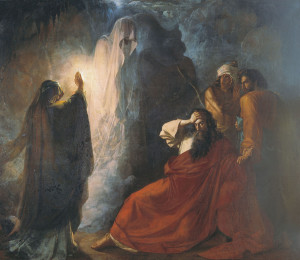This is a case of a young man of humble origins who suddenly and unexpectedly becomes the first king of the Israelites. His first coronation is done privately and God’s spirit comes upon him as he needs to immediately step into his new national role for which he does not receive a set of instructions, nor does he have role models; he is the first one and he starts his role as king with God’s spirit upon him. It seems to be a promising and fortuitous beginning but it does not last. As a result of his sin of which he says, “I have transgressed the word of God and your word because I feared the people,” he is being punished.
God’s spirit leaves Saul – and comes upon young David (who is secretly anointed by the prophet). Saul is thereafter afflicted with “God’s bad spirit”, and becomes fearful and depressed. Young David is brought to his palace in order to sooth Saul’s bad spirit with his music, but before long Saul realizes that the gifted musician (and his son-in-law) is his nightmare, a threat to his reign.
The jubilation that greets the warriors returning from defeating the Philistines ignites King Saul’s envy in young David: the women’s song opens with praise for the king, “Saul has slain his thousands” yet heaps praise on the young warrior, “David his tens of thousands.” Saul comes to realize that the musician (his subordinate) has gained what he had lost: David has God’s spirit and is successful in all that he does. Saul’s envy turns into intense hostility; it is fueled by depression and fears that emerge when God’s spirit leaves him and is replaced by the “bad spirit” and tantrums. “Saul feared David, for God was with him, and God turned away from Saul.” David turns from a beloved musician to an enemy, “From that moment and to the end, Saul regarded David as his enemy.” Saul is haunted by terror and the bad spirit that fuels his desire to kill David.

Saul’s determination to destroy David makes him self-destructive, obsessed by the overpowering negative spirit and emotions. In the last stage of his life, Saul is a tragically lonely king deprived of God’s spirit. In a desperate effort to re-connect to Heaven he goes to the house of a woman of En Dor who was known for communicating with the dead, as he attempts, with her help, to speak to the deceased Samuel. There and then Saul sums up in great anguish his tragic loneliness and desperation: “God has turned away from me and does not answer me anymore.”
Translated from the Hebrew by Ayala Emmett